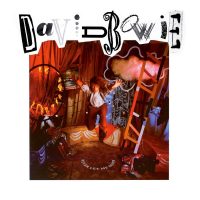 Written by: David Bowie
Written by: David Bowie
Recorded: September-November 1986
Producers: David Bowie, David Richards
Released: 20 April 1987
Available on:
Never Let Me Down
Glass Spider (Live Montreal ’87)
Personnel
Contents
David Bowie: vocals, keyboards, Mellotron, Moog synthesizer
Carlos Alomar: guitar, backing vocals
Peter Frampton: guitar
Erdal Kızılçay: keyboards, bass guitar, drums
Crusher Bennett: percussion
Robin Clark, Loni Groves, Diva Gray, Gordon Grodie: backing vocals
2018:
Reeves Gabrels: lead guitar, rhythm guitar, ambient guitar
David Torn: lead guitar, ambient guitar
Steven Wolf: drum programming, bass programming
‘Glass Spider’ opened side two of David Bowie’s 1987 album Never Let Me Down, and lent its name to that year’s Glass Spider Tour.
A mother-figure number! One’s feeling of isolation when you’re launched off into the world. You always think your mother’s there, but of course she never really is; however close you are to your parents, they can never be any nearer then they were when you were about five or six. ‘Mommy, come back ’cause the water’s all gone’: the water’s kind of the substance of meaning of life.
Music & Sound Output, June 1987
Beginning with a spoken-word monologue redolent of Diamond Dogs’s ‘Future Legend’, ‘Glass Spider’ trod the fine line between theatricality, 1980s bombast, and overblown ridiculousness, but at its heart is a tale of children abandoned by their mother.
‘What’s all this about glass spiders? What is it you’ve got going on with spiders, Bowie?’ I don’t know. Spiders keep coming up in my references all the time, from obviously the Spiders From Mars. I don’t know what the Jungian aspects of it are but I see it as some kind of mother figure. [laughs] Do you want to run with that for a bit? It’s the pivotal song on the album, and it’s the idea of children when they eventually… there’s a point in every child’s life when it realises its parents are really not something they can depend on for everything. They are kind of on their own. It’s that kind of feeling, and that permeates the feeling of the show that I’m putting together.
London press conference, March 1987
The song opened each date of the Glass Spider Tour. Bowie later expressed regret at how the production, which featured a giant spider structure straddling the stage, had turned out.
I admit, I overstretched and put too many fine details into something that was going to be seen (indicates tiny figure with his finger and thumb) this big. Serious Moonlight worked much better because they were much broader, bigger strokes yet there was detail work as well. There were facial moves. I mean, why bother? It was only for myself really. It was so great to burn the spider in New Zealand at the end of the tour. We just put the thing in a field and set light to it. That was such a relief!
Q magazine, June 1989
The release
Never Let Me Down was released on 20 April 1987, with ‘Glass Spider’ as its sixth track.
On the original vinyl edition, seven songs were edited for length. ‘Glass Spider’ was reduced from 5:30 to 4:56.
I just loved Peter Frampton. We bonded as lead guitar player and rhythm player on ‘Glass Spider’, and that man can play his ass off. He is a sweetheart and I thought that David taking him and putting him on the pedestal that he so deserved was just amazing.
David Bowie: Ultimate Record Collection (Uncut)
The 2018 box set Loving The Alien (1983-1988) contained four albums which included versions of ‘Glass Spider’, including Never Let Me Down.
It also contained Never Let Me Down 2018, a reworking of the album which retained Bowie’s vocals and added new instrumentation. ‘Glass Spider’ featured guitarists Reeves Gabrels and David Torn, and bass and drums programmed by Steven Wolf.
‘Glass Spider’ was also on the live album Glass Spider (Live Montreal ’87), and the Re:Call 4 compilation, which contained the original vinyl edit of the song.
I was fascinated by the fact that the black widow spider does lay out its victims’ skeletons on a web. I found that out a few months ago; it came up in some documentary on television. I just took it from there. I have this thing about spiders representing motherhood – play around with that one! I always saw spiders as being a maternal thing, and I wanted to have an all-encompassing motherhood song: How one is released from the mother and then left on one’s own, and you have to get by on your instincts. I wanted to develop the fable of the black widow spider, transform it. The reference to glass is obviously fitted. Putting the two together, “glass spider” reminds me of castles and something almost Chinese. Imagine this layer of webs like a castle; it moves from room to room and had a kind of altar at the top. It’s fabricating a mock mythology. The subtext for that one was motherhood: being abandoned by one’s mother, which is inevitable.
Musician, August 1987
